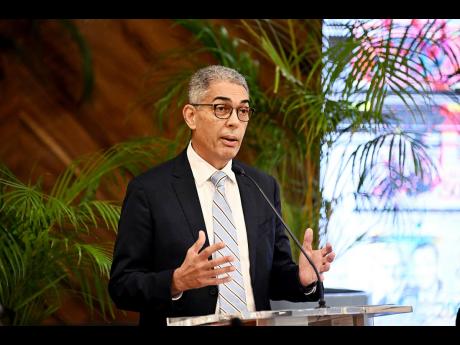Editorial | BOJ, oversight and hazards
This newspaper supports the principle that the owners of badly managed financial institutions should not be bailed out by taxpayers when their businesses go bust.
However, in formulating policies, no government, including Jamaica’s, can be so rigid as to foreclose on their options to act in the best interest of national economies during periods of crisis. In other words, legislation ought not to be the source of detrimental moral hazard.
In that regard, we look forward to fuller particulars from Bank of Jamaica (BOJ) Governor Richard Byles and the finance minister, Nigel Clarke, on the proposed law, which, according to Mr Byles, will insulate taxpayers from any future failure of financial companies.
“Don’t forget that when an institution fails, and the taxpayers have to draw the cheque, then it becomes a lifelong debt around your neck,” the central bank governor was quoted as telling members of the Pension Industry Association of Jamaica last week.
Mr Byles, of course, has profoundly solid reasons – recent and historic – for offering this admonition.
Indeed, there is still uncertainty over what hit clients of securities company Stocks and Securities Limited (SSL) are likely to get after last week’s decision by a court that the business was insolvent and should be wound up.
While the proximate trigger of SSL’s collapse was the company’s disclosure 17 months ago that a senior employee had stolen hundreds of millions of dollars from clients, it emerged that the firm was a poster child of poor management and weak to inept regulatory oversight. Internal reports by the Financial Services Commission, the regulator for non-bank financial institutions, revealed that long before Jean-Ann Panton confessed to stealing what, at the time, was the equivalent of J$250 million from clients, the company had, for years, breached statutory ratios. The regulators would issue warnings but failed to follow through on its threats.
By last December, the finance ministry’s Financial Investigation Division, which probes certain types of financial fraud, reported that the theft at SSL had reached US$30 million (J$4.7 billion), affecting 8,000 client accounts.
However, the estimated J$30 billion of client money SSL had under management was a mere two per cent of the investment industry’s overall portfolio.
FAR DEEPER
While SSL’s problems provoked the proposed reform of the oversight arrangements for non-bank investment houses (they are brought under the scrutiny of the central bank), the issue that, perhaps, really animates Mr Byles is far deeper and goes back decades: the financial sector meltdown of the late 1990s in which banks and insurance companies collapsed and pension funds came to the brink.
Twenty-eight years after the crisis began to unfold, there is still controversy over who or what caused it – inappropriate government policies; bad decisions by financial managers who used short-term money to finance long-term assets; whether they took on overly risky investments; or if they bulked up the institutions with their own debt.
What is not in dispute is the method used by the Government to fix the problem: a vehicle called the Financial Sector Adjustment Company (FINSAC), whose work led to another round of controversy. FINSAC took over, ‘rehabilitated’, and sold a raft of banks and insurance companies. Depositors lost no money. They received all their principal and interests they had in banks and other entities.
However, thousands of debtors who were hit by the high interest rates of the time forfeited property. In some cases, their businesses went belly up.
Taxpayers, however, paid heavily for the bailout. In the end, it cost around 40 per cent of Jamaica’s gross domestic product (GDP).
Moreover, the reversal (until the 2010s) of the downward trend in Jamaica’s debt-to-GDP can be traced directly to the FINSAC intervention. In 1996, as the crisis was beginning to emerge, Jamaica’s debt was 76 per cent of its GDP, down from 80 per cent the previous year. By 2003, with the Government having brought the FINSAC debt on to the books, it was 147 per cent.
SERIES OF REFORMS
Since then, Jamaica has undertaken a series of reforms to banking regulations and financial-sector oversight. A deposit insurance scheme, for example, is in place that caps the amount of money depositors are assured of getting back in the event a bank goes belly up.
But the SSL debacle caused the Government to propose a so-called ‘twin peaks’ regulatory framework for investment houses under which the central bank will have oversight of their financial management while some other agency monitors consumer/marketing arrangements.
“This legislation is designed to make institutions stay safe, but the moment they start showing signs of weakness, to trigger a process that ensures that they do not become a liability to taxpayers,” Mr Byles said.
There is nothing, conceptually, with which to disagree in Governor Byles’ statement. Neither the central bank nor the Government would wish to create a moral hazard for taxpayers by opening the door to the resolution of a future financial crisis in the fashion of the one of the 1990s, notwithstanding the declaration of the government of the day that to do otherwise would have been to risk social and economic chaos.
However, governments need the flexibility to act in the best interest of the society and the State, particularly in periods of systemic crises. The regulatory question raised by Mr Byles, therefore, needs a full and transparent discussion.

